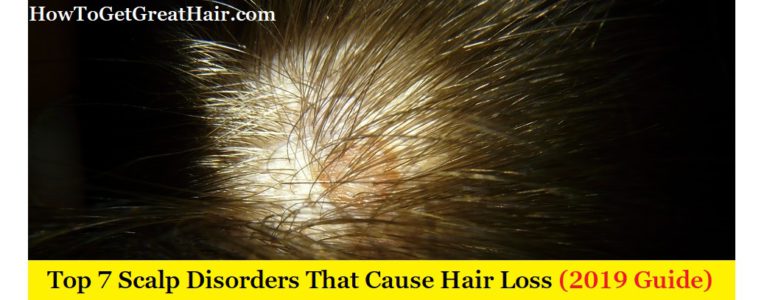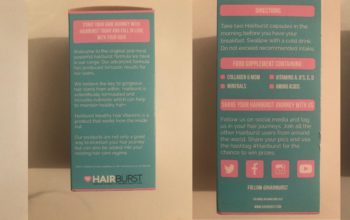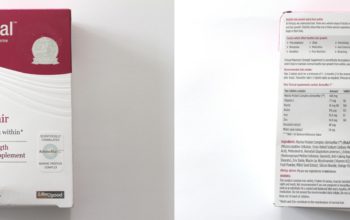
Is your hair falling out massively – or just a bit?
Either way, the cause behind isn’t always stress or being over 60 in age. In fact – sometimes it’s a local problem.
So if that’s your case as well – here are the top 7 scalp disorders that cause hair loss.
How can you tell if that’s your problem?
- Pay attention to the major symptoms.
- Try to see if you recognize any (in your hair loss pattern).
- If you do, see a specialist and get tested.
#1 – Scalp Ringworm
Ever heard of Tines Capitis? Well – it’s the same thing as scalp ringworm.
This is a scalp infection produced by a fungus – but it’s more dangerous than it seems:
- First of all, it’s very contagious
- Secondly, it can cause serious scalp issues
1. Main Symptoms
Most importantly – this affection isn’t caused by a worm (as the names suggests).
Instead, it’s a fungus behind.
Now – scalp ringworm has one major symptom: patches of scaly skin in the scalp.
- they grow overtime
- there’s no or little hair in the area
- if there’s any hair, it’s very thin and fragile
- so it breaks off really easily
So in most cases, those patches destroy the hair above – causing bald spots all over the scalp.
Also – thy can be painful, but that depends from person to person.
2. Solutions & Treatment
Scalp ringworm is a serious problem, so:
- seeing a doctor is essential
- it’s also very contagious
- that’s why it’s important to treat it as fast as possible
Once you see a doctor, he will prescribe you the right medication. So your infection should go away in 1-2 months.
And don’t worry. Once you treat it, the hair from the affected area will grow back normally.
#2 – Folliculitis
This condition is easy to explain – it’s the inflammation of hair follicles.
Now – why would a hair follicles get inflamed? There are 3 main causes:
- bacterial infections (usually Staphylococcus aureus)
- fungal infections
- viruses
The problem is that folliculitis can spread really fast from 1 hair follicles to others.
1. Main Symptoms
How exactly can you recognize this condition?:
- red patches or small pimples right under hairs
- itching and pain
- hair that breaks easily
Now – in most cases, the swollen follicles are full of liquid. So once they break off – the hair above also breaks off.
That’s why hair loss is associated with folliculitis so often.
2. Solutions & Treatment
In many cases – folliculitis only affects a few hairs, so it goes away on its own.
But if you notice more and more hair falling out every day – it’s probably a more serious form.
In this case, seeing a doctor is the best thing you can do:
- you might need antibiotics
- the infection could spread otherwise
Normally – folliculitis should get better in 1-2 weeks. So your affected hair will grow back normally.
#3 – Alopecia Areata
If you heard of spot baldness – well, it’s the same thing.
Now – this isn’t a real affection, because it doesn’t have a certain cause:
- some people say it’s auto-immune
- others say it’s due to stress
- while others claim it’s genetic
Either way, Alopecia Areata is one of the top 3 scalp disorders that causes hair loss.
1. Main Symptoms
Thing is – most people with this condition are healthy (no other affections).
So the only symptoms are scalp-related:
- small bald patches
- in most cases, they are round or circular
- sometimes more bald patches can appear
Basically – all your hair from a small area falls out completely.
In some cases, it can fall out in several spots throughout the scalp. But that’s more rare.
2. Solutions & Treatments
Alopecia areata is very different from person to person:
- in some, hair grows back really fast
- in others, it grows back but it takes several years
- while in rare cases, it doesn’t grow back at all
So if you notice a bald spot on your scalp, see your dermatologist.
You will have several tests – so you will manage to keep the hair loss under control.
Even if you’re a rare case (where hair doesn’t grow back at all) – there are still medications and solutions nowadays.
#4 – Dermatitis
Here I’m talking about Seborrheic Dermatitis – a condition that everyone knows.
Now – it appears because of 3 reason:
- overproduction of sebum
- oily scalp
- fungal infection
However, it’s not such a serious problem as the previous 3.
1. Main Symptoms
Weird enough – dermatitis can lead to hair loss, without affecting the hair itself.
So basically, this condition doesn’t actually harm the hair.
Instead – here’s what it produces:
- white patches similar to dandruff
- greasy skin
- itchy scalp
Basically – it doesn’t affect the hair follicles, nor the hair strands.
However, it causes excessive itching – which has high chances to affect your hair.
2. Solutions & Treatments
There are many remedies for Seborrheic Dermatitis:
- shampoos
- creams and lotions
- anti-fungal products
Seeing a dermatologist would be the best advice – as he would know exactly what to recommend you.
Now – in case some of your hair broke due to excessive scratching, don’t worry. In this case, it will regrow normally very fast.
#5 – Lichen Planopilaris
Despite having a complicated name – this condition is pretty simple:
- causes swelling and irritation
- it can affect skin, nails, membranes or even hair
Even though it’s not contagious, it can cause real problems (including hair loss).
1. Main Symptoms
As I said – this condition can affect different parts of your body.
But I will only focus on the hair form – here’s how you can spot it:
- hair falling out in patches
- itchy and painful scalp
- red and swollen follicles
So the hair loss produced by Lichen Planopilaris is similar to the one from Alopecia Areata.
But in this case, follicles are also swollen (just like in folliculitis).
Sp basically – it’s a combination between those 2 conditions.
2. Solutions & Treatment
Now – many forms go away on their own.
But if you already started losing hair in patches, things are more serious.
A dermatologist is the only one who could diagnose your problem correctly – so I advise you to see one fast.
#6 – Dandruff & Itchy Scalp
Everybody had to do with dandruff at least once – do you agree?
So how exactly can dandruff cause hair loss?:
- makes your scalp irritated and itchy
- scratching weakens hair follicles
- hair breaks off more easily
1. Main Symptoms
As I said – dandruff and itchy scalp don’t affect the hair itself.
The only harm the scalp and irritate it. Due to excessive scratching, your hair will start to break easily and fall out.
Now – how exactly can you spot this problem? I think it’s quite easy:
- small white flakes
- itching
- minor rash
Also – dandruff can affect your eyebrows, beard or facial hair.
So it’s not all about the scalp.
2. Solutions & Treatment
In this case, seeing a doctor isn’t a must. However – he could recommend you the best treatment for sure.
But in case you prefer to solve the problem yourself, here are the options:
- professional products
- anti-dandruff shampoos
- special lotions
- different herbs
Basically – dandruff can be treated at home, especially if it’s something temporary.
But in case it lasts for more than 3 months, I think a doctor would help a lot more.
#7 – Psoriasis
Here’s another problem everyone knows.
There are millions of people suffering from psoriasis worldwide. And in most cases – it’s the scalp that is affected.
1. Main Symptoms
First of all – psoriasis itself doesn’t cause hair loss:
- it only causes excessive scratching
- so it weakens hair follicles
Basically – it affects the hair in a similar way to dandruff: not directly.
Now – here’s how scalp psoriasis looks like:
- flakes similar to dandruff (but in a silver color)
- terrible itching
- dry scalp
- irritation
2. Solutions & Treatments
Unfortunately, psoriasis can’t be cured completely:
- it can go away for a while
- but it will probably come back at one point
Now – if your scalp psoriasis is making your hair fall out, it’s essential to keep the affection under control.
I would recommend seeing a specialist, because he could prescribe the best treatment – according to your exact symptoms.
But if you prefer to avoid doctors, professional products against psoriasis might help.
My Verdict – So What’s Causing Your Hair Loss?
If you’re reading this article – the problem probably lies in your scalp.
So what scalp disorder could be making your hair fall out?
Well – there are 4 MAIN AFFECTIONS THAT CAUSE HAIR LOSS:
- Scalp Ringworm
- Folliculitis
- Alopecia Areata
- Lichen Planopilaris
If you have one of them – treating the problem is a must. Otherwise – your hair will continue to fall out.
On the other hand – there are 3 AFFECTIONS THAT LEAD TO HAIR LOSS (as a consequence):
- Dermatitis
- Dandruff
- Psoriasis
Basically – these problems don’t harm the hair itself, but they weaken the follicles.
So they increase hair loss indirectly.
What Can You Do About It?: I recommend seeing a doctor in any of these 7 conditions:
- can diagnose the problem correctly
- will prescribe the right treatment
- will keep you under close observation
In some cases, you can treat your problem on your own.
But nothing compares to a specialist – so your condition might come back if you treat it randomly.
That’s why consulting a doctor seems the best choice, in my opinion.







Hi! My elder brother was diagnosed with alopecia areata when he was 15, he got 2 or 3 bald spots overnight. My parents took him to a specialist so that’s how they found out the diagnoses. He said it’s an autoimmune problem and it’s a matter of luck whether it progresses or not. I know his hair grew back but it would fall out in the same spots whenever he was sick or very stressed. And he’s been like that since I can remember, he has bald spots every year and then hair grows back, then it falls out once again.
My question is if I could have the same issue? I’m 8 years younger than him and I’m at the age when he first experienced the symptoms. I recently found a small area on my head with lighter hairs (as color) and I freaked out. None of my parents had this and they tell me not to worry about it, as it’s not the same thing as in my brother. But I’m still scared…do you think I should see a doctor? There’s anything I can do for prevention?
Hi Mike, alopecia areata is a scalp problem with an auto-immune cause. So you can’t really control or prevent it.
Now – in many cases, it’s genetic. But since you have no one in your family (I’m talking about parents and grandparents), there’s no risk. In your brother’s case – it might be a coincidence, in my opinion it’s surely not genetic.
Regarding that lighter piece of hair – I understand what you mean. There are many people experiencing this and it’s usually not related to any condition. So I don’t think it could be a beginning of alopecia areata.
You can check with your doctor if you want – but I doubt it’s going to be any real issue. Also, there’s no need to use any supplements or pills, considering you don’t have any shedding right now.
Sorry I can’t help more, I’m not an expert – but from your description I doubt it’s anything serious.
Thank you for this helpful article about the top 7 scalp disorders that cause hair loss. My 10 year old son had been losing his hair in one area on his head, it was not very noticeable but it kept getting worse and although it didn’t hurt him he kept scratching and touching the area. I have been wondering what it is but lately it seemed to have gotten so much worse so i went online to investigate and found your post. so I looked closer at his scalp and sure enough I could make out a small red ring. I immediately took him to the doctor where he was prescribed antifungal cream and they told me to keep him out of school for a few days to avoid contagion. Because of your post I was able to identify my son’s condition and have him treated quickly. Thank you so much!
Hi there, it’s great to hear you found the actual problem of your son. Ringworm is a very serious scalp problem and it can affect more than hair – it can also affect general health, which is a lot more dangerous.
The proper treatment will surely solve the problem. Just keep an eye on your son’s lesions to make sure they respond well to the treatment. Hope this helps.
Hello Olly,
I have pretty full and healthy hair. As long as I remember myself, it falls off more than I wish, but it seems natural as it grows back and I don’t lose overall volume. I found your post because lately, my scalp became itchy; my hair doesn’t seem to be affected or falling more than usual. I don’t have dandruff or any visible marks on my scalp. I read all the causes you listed, and some or all of the symptoms in each of them are not matching mine.
I have to say that I am in the early 50s, my thyroid recently failed, and I seem to have not only the scalp but overall skin issue, including itching. My hypothyroidism is associated with Hashimoto’s autoimmune disease.
You mentioned autoimmune in Alopecia Areata case. I don’t think that’s what I have, but I wonder if my itching skin and scalp could be caused by Hashimoto’s Thyroiditis…
I’ll take your advice and talk to my doctor about it. Do you think that changing shampoo & conditioner could make a difference?
Thank you for the educational article. Even though I didn’t recognize my issue among those you described, it was still very helpful to rule them out.
All the best,
~ Julia
P.S. Your hair on the picture looks beautiful! I would never have guessed that you had a hair loss problem. Good job!
Hi Julia, thanks for your kind words. In my opinion, your scalp itching could be related to your hypothyroidism. But let me ask – did it start around the same period as your thyroid problems? Because if it appeared early than your condition, I doubt it’s thyroid-related.
But out of the most common hair loss causes in your age, I think thyroid issues fits best to your symptoms. Anyway – consult your doctor and let me know what he says.
Regarding your question – if your itching is caused by thyroid issues, changing your hair problems won’t really help. It will help for a while (1-2 months), but then the itching will come back. That’s what usually happens when the problem has an internal cause.
If you start taking the right thyroid medication, your symptoms should slowly improve. That includes the itchy scalp too.
I wouldn’t recommend you any supplement or product until you hear your doctor’s opinion. So please let me know what he says. Hope this helps.
I have had an itchy, sore and slightly inflamed area on my scalp for about 12 years. The dermatologist gave me topical Clobetesol but I haven’t found it helped. Recently a new dermatologist gave 10mg injections into my scalp around the worst area, of the same substance. I immediately worsened and quite a large area of hair fell out leaving a bald area which was also very sore. I am now taking Plaquinel orally and they tell me it will take at least 3 months to work. An earlier biopsy showed nothing but I am thinking of trying another. My thyroid test is in the normal range but definitely on the low side. My scalp looks closest to the ringworm pictures but I don’t think it is quite ringworm. Besides my husband has never caught it from me. My body also has some itchiness although not as bad and not sore. I have 2 dermatologists involved and they are not helping me. Do you have any ideas? I am becoming quite depressed. I am also trying hydrocortisone and another cream called Tacrolimus ointment.
Hi Jennifer, your story is really impressive, it’s so sad to hear the doctors couldn’t find a solution yet. But they’re probably not looking at the right thing. Once they found out what’s causing your problem, it should be quite easy to treat.
So let’s take it from the start:
1) You were prescribed Clobetesol without any effect. This is a corticosteroid that is recommended for minor to average scalp issues, like dermatitis, recurring dandruff and even psoriasis. I used this product for dermatitis and it helped. Anyway, the point in your case is that it’s probably not a minor issue – nor an auto-immune one (it should have gotten better with Clobetasol).
2) Your sudden hair loss probably appeared as a reaction to Clobetasol. As I said, it’s a corticosterioid – a class of drugs that can also cause hair loss. Since it was injected directly and in a high dosage, it’s probably the reason why it affected your hair so badly. Also, did your hair start growing back in that area?
3) Plaquenil is a drug prescribed for malaria or auto-immune affections. So your doctors probably think the problem is caused by an auto-immune thing, which I personally kind of question. If it was auto-immune, it should have gotten a bit better after Clobetasol. But I definitely respect your doctors’ opinion, since they are specialists on that field. So I think it’s better to stick to the treatment for now.
4) Regarding ringworm, I also think you don’t have that. This infection causes hair loss itself, so you should have started losing hair in the area after the first symptoms. Instead, your hair loss was surely caused by the injections – so you probably don’t have any ringworm (plus the fact that your husband didn’t catch it).
I’m not very sure about what could be the issue, but let me ask you a few questions:
– How large is the inflammation? Is it an area that looks larger? Or does it feel larger if you touch it? Is it hard or is it soft?
– How is your health condition other that that? Except the general itchiness, are you experiencing any other important symptoms (fatigue, nausea, vomiting, pain, etc.)?
– Very important: do you have any fever? Have you had any recently, without knowing the reason? If your problem is caused by a bacteria/infection, you should have had fever at least once.
– Have you had any other blood tests, except for thyroid?
I personally don’t think you should take another biopsy. If it was cancer, your symptoms would be far worse than that (brain cancer comes with terrible headaches, nausea and vomiting most of the times). The inflammation might be a tumor, but it’s very unlikely. And in the worst case, it’s probably benign. So I think there’s no reason to freak out, especially if your symptoms are mostly local (that body itch isn’t a sign of a serious health condition).
I’m also thinking that you might have some parasite that ended up locating in your head, but it’s actually affecting your body. That might explain the itch. But once again, these are just assumptions, I don’t have enough evidence to give you a clear answer, I am only trying to investigate all possible causes. Anyway, in case of a parasite, the treatment is quite simple – so there’s no reason to freak out.
Answering the questions from above would really help me get a better idea about your problem. So please let me know.
does lichen planus affect the entire scalp? I have suffered with severe to mild pain, itching for 7 years now. plus my scalp is anywhere from dark red to pink. My entire head itches. my head feels as if there ‘s a vice around the circumference squeezing. have lost at least 40% of my hair (doesn’t grow back) have had 2 biopsies which did not even show any infection. Was treated with clobetesol liquid and approximately 5-8 cortisone shots every 6 weeks. the pain eventually became so intense that it and redness moved down my forhead. I suggested they do allergy testing, 30 on back, and found i was allergic to the clobetesol and the cortortisone shots. they thought for sure I was allergic to hair dye but was not. I am an itchy person especially on hands, arms, neck, ears…more itching at night. Any suggestions? HELP?. I have seen 3 dermatologists and none can help & basically gave up. thank you.
Hey Iana, I’m really sorry to hear you’re struggling with such a severe condition. There’s not much I can help you with, but I will try to give you some tips and my honest opinion.
First of all – your problem really sounds like Lichen Planus. I personally don’t know any other condition that could cause this kind of symptoms and severe itching. To answer your first question – yes, Lichen Planus can affect the whole scalp (and sometimes even parts of the skin in any area of the body). You probably have a more severe version, since it’s your whole scalp that is affected.
Now – Lichen Planus is an auto-immune condition. This means your body attacks your scalp cells because it doesn’t recognize them as being normal cells. This is actually a malfunction of your body’s immune system. The problem is that auto-immune conditions don’t have an actual cure. There are ways to keep the symptoms under control but you can’t change the way your body regards certain cells.
The standard treatment for auto-immune conditions are drugs that decrease the immunity. In this way, your body stops attacking itself (or rather it attacks itself less) – so the symptoms also get better. However, this means your general immunity will also decrease, making you more likely to get infections and colds. So that’s the main downside of auto-immune medication.
Regarding the treatment you used, it’s actually a great one. Instead of prescribing you drugs that decrease your body’s immunity, your doctor prescribed local immunity suppressants. This means you were given some drugs that have a local effect (on your scalp), so they didn’t affect your body’s power in fighting with infections. Local immunity drugs are recommended in scalp problems caused by auto-immune conditions.
The problems is that you were allergic to those drugs – so in your case, they did more harm than good. That’s a pretty unfortunate situation, if you ask me. In a non-allergic person, they would have been the best solution.
Now let me ask – did your hair loss begin before or after starting the treatment with Clobetasol and those cortisone shots?
If I were your doctor, I would probably try prescribing you general immunity suppressants for a while and see how your symptoms go. Those drugs are a bit dangerous because they decrease your immunity, so you can catch colds and minor infections more easily. But they might also control your symptoms much better, since they didn’t decrease after using local immunity suppressants. So I would try to see what general drugs can do for a while and decide on the future treatment depending on that.
Anyway, my advice would be to visit a specialist in immunology and let him know about your condition (Lichen Planus), your previous treatment and the allergies you experienced. Dermatologist can only treat your problem locally, but this doesn’t seem to work. So an immunologist could see the whole perspective and maybe prescribe you a general treatment (which might be more helpful).
That’s the best advice I can give you right now. I really hope this is going to help you and please let me know what happens in the future.